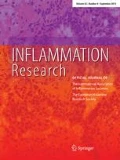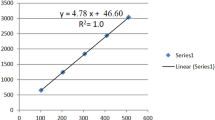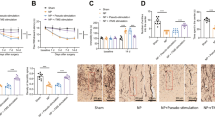Abstract.
Objective: The antinociceptive effect of the new cyclooxygenase (COX)-2 inhibitor, meloxicam, given intraperitoneally (i.p.), was assessed in different models of chemical and thermal nociception in mice.¶Material and Methods: The analgesic effect was analysed using acetic acid-induced abdominal constriction (AA), formalin and capsaicin-induced licking, and hot-plate tests.¶Results: The treatment of animals with meloxicam or diclofenac (2.8–94.3 μmol/kg, i.p. 30 min prior) caused graded and significant inhibition of AA, with mean ID50 values of 7.4 and 38.0 μmol/kg, respectively. At the ID50 level, meloxicam was about 5-fold more potent than diclofenac. In the formalin test, meloxicam or diclofenac (0.8–94.3 μmol/kg, i.p. 30 min prior) also caused significant inhibition of both the early (neurogenic pain) and the late (inflammatory pain) phases of formalin-induced licking. The calculated mean ID50 values for the early phase were: 7.1 and > 94.3 μmol/kg, while for the late phase they were 2.8 and 34.5 μmol/kg, respectively, for meloxicam and diclofenac. Meloxicam also caused significant inhibition of formalin-induced oedema ( p < 0.05). Meloxicam and diclofenac (0.8–314.4 μmol/kg, i.p. 30 min prior) produced significant and dose-related inhibition of neurogenic nociception caused by topical injection of capsaicin, with mean ID50 values of 4.0 and 47.4 μmol/kg, respectively, but were ineffective in the hot-plate model of nociception.¶Conclusions: The present study shows that meloxicam dose-dependently exhibited systemic antinociceptive action when assessed against neurogenic and inflammatory pain caused by acetic acid, formalin and capsaicin models. In contrast, when assessed in the hot-plate test, meloxicam had no significant effect. Thus, meloxicam and other COX-2 inhibitors might be useful for therapeutic intervention in the management of neurogenic and inflammatory pain.
Similar content being viewed by others
Author information
Authors and Affiliations
Additional information
Received 7 January 1998; accepted by K. Brune 17 April 1998
Rights and permissions
About this article
Cite this article
Santos, A., Vedana, E. & De Freitas, G. Antinociceptive effect of meloxicam, in neurogenic and inflammatory nociceptive models in mice. Inflamm. res. 47, 302–307 (1998). https://doi.org/10.1007/s000110050333
Issue Date:
DOI: https://doi.org/10.1007/s000110050333




